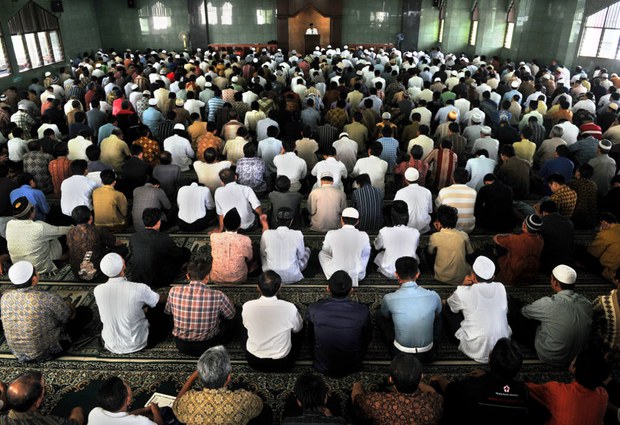Dozens of State-Run Mosques in Jakarta Promote Radicalism, Study Says
2018.07.09
Jakarta
 Indonesian Muslims listen to a sermon during a Friday prayer at a mosque in Jakarta, June 4, 2010.
Indonesian Muslims listen to a sermon during a Friday prayer at a mosque in Jakarta, June 4, 2010.
Forty percent of mosques and worship spaces at state-owned enterprises and government institutions in Jakarta are promoting radical sermons, according to a new study by an Indonesian organization representing Islamic boarding schools.
Twenty-one mosques at state-run companies and 12 at buildings owned by government ministries, among others, had engaged in discussing radical ideas, such as the creation of a caliphate, Agus Muhammad, head of the supervisory board at the Association of Islamic Boarding Schools and Society Development (P3M), told reporters.
“It can be considered a red alert as far as mosques at the state-owned companies are concerned,” he said.
“We hope that the DMI looks deeper into these findings and takes necessary action,” he added, referring to the powerful Indonesian Mosque Council.
The study, conducted by P3M and the nongovernmental organization Rumah Kebangsaan, analyzed 274 videos and hundreds of audio recordings taken by volunteers at 100 mosques from Sept. 29 to Oct. 21 last year, Agus said during a news conference in Jakarta on Sunday.
“We defined radicalism as ideas that called for fundamental changes,” Agus said.
The researchers also studied Friday bulletins and leaflets at the mosques, he said.
But Imam Addaruquthni, secretary-general of the DMI, dismissed the significance of the report.
“Radical can mean critical [of the government] ... but that doesn’t mean that they harbor intentions to undermine or threaten the state,” he told BenarNews on Monday. “They may be radical in criticizing the government, because there are injustices to be critical about.”
There are about 800,000 mosques in Indonesia, the world’s largest Muslim-majority nation, which has a population of about 262 million. But those places of worship, spread across a nation of about 18,000 islands, are not as big as those in Saudi Arabia and other Middle Eastern countries.
Of the 41 out of 100 mosques monitored to have espoused extremist views, 17 were considered highly radical, with preachers provoking their congregations to carry out “intolerant acts,” Agus said, without elaborating.
Abdul Manan Ghani, chairman of Nahdlatul Ulama (NU), the country’s largest Muslim organization, expressed concern about the findings and called for closer government supervision of mosques.
“Those mosques are probably funded by the state but are being used to promote intolerance,” Abdul Manan told the same news conference at NU headquarters in Jakarta.
Steps taken after complaints
Mastuki, a spokesman for the Religious Affairs Ministry, said officials took steps last year after receiving complaints from the public about sermons that had the potential to foment unrest.
“Maybe radical sermons were not completely eradicated at that time. There should be a new survey this year and things probably have changed,” he told BenarNews.
Mastuki said a previous survey had helped the government identify problems.
“We are considering issuing a code of ethics for public preachers from all religions. We are consulting mass organizations and we are having internal discussions on this issue,” he said.
Evidence that evolving religious conservatism and intolerance is changing the character of the Indonesian society was highlighted in April this year when the head of the National Intelligence Agency (BIN) released results of a 2017 survey. It showed that 39 percent of college students had been exposed to radical ideas.
“This condition exists in 15 Indonesian provinces and grabbed our attention of radical movement,” Budi Gunawan said during a lecture at a college seminar in Semarang, Central Java.
As a result of that report, heads of Indonesian universities in June 2018 discussed a plan to begin collaborating with the national counterterror agency (BNPT) to establish an intelligence body that would monitor surveillance on campuses in order to detect extremist ideology and behavior.
But opponents of that plan warned it could stifle free speech and learning on campuses.
“We have to keep freedom of expression and creativity on the campus. If not there, where else?” said Ali Wibisono, a lecturer on terrorism and international security at the University of Indonesia in Jakarta, told BenarNews.
“I cannot see any strong country in the world whose counterterrorism policy is effective by controlling its universities,” he said.







